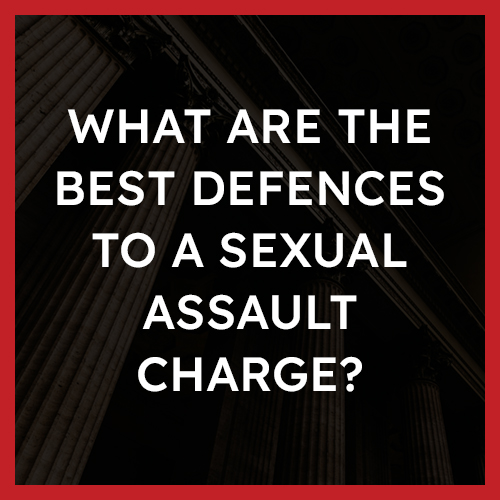What are the best defences to a sexual assault charge?
 The best defence to a sexual assault charge depends heavily on the circumstances of your case. However, two common defences to an allegation of sexual assault are (1) that the complainant consented to the act in question, or (2) that you held an honest but mistaken belief that the complainant had consented to the act.
The best defence to a sexual assault charge depends heavily on the circumstances of your case. However, two common defences to an allegation of sexual assault are (1) that the complainant consented to the act in question, or (2) that you held an honest but mistaken belief that the complainant had consented to the act.
Because the Crown Prosecutor must prove beyond a reasonable doubt that the complainant did not consent to the act in question, if you can demonstrate that there is reason to believe there may have in fact been consent, you can be acquitted of the charges.
You can also defend your case on the basis that you honestly, but mistakenly, believed that the complainant had consented to the act in question. However, in order to raise this defence, it is necessary that you do something more than just say “I thought that he or she consented”. You will need to put forward enough evidence in support of your claim so that it can be said there is at least an ‘air of reality’ to your honest but mistaken belief. If you cannot provide a foundation to support your claim, you will not succeed with this defence.
In order to raise either consent or honest but mistaken belief as a defence, you must also demonstrate that you took reasonable steps in the circumstances to determine whether the complainant had consented to the act in question. Passivity, silence, equivocal responses, or a failure on the part of the complainant to say no will not amount to consent. Consent must be communicated clearly, and must be present throughout the entire interaction.
However, neither the defence of consent or the defence of honest but mistaken belief can be used if you were reckless or willfully blind as to whether or not there was consent. For example, you will be reckless or willfully blind to the issue of consent if the complainant takes actions suggesting that he or she revoked consent or maybe did not consent, but you ignore the complainant’s actions and continue anyway.
Furthermore, neither of these defences will succeed if you were simply too intoxicated to understand that there was no consent. For the purposes of this offence, your voluntary intoxication cannot serve as a defence for your actions.
About The Author
Ask A Question
We endeavor to respond to questions within 24 hours. If your matter is urgent, please call our office or submit a request for a free consultation.







